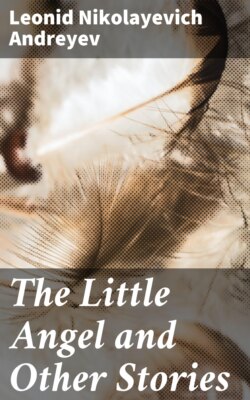Читать книгу The Little Angel and Other Stories - Leonid Nikolayevich Andreyev - Страница 13
На сайте Литреса книга снята с продажи.
II
ОглавлениеTable of Contents
Spring came on, and the quiet bungalow was all a-voice with loud talk, the creaking of wheels, and the stamping of people moving heavy things. The owners had arrived from the city, a whole merry troop of grown-up people, of half-grown ups and children, all intoxicated with the air, the warmth and the light. Some shouted, some sang, and some laughed with shrill female voices.
The first with whom the dog made acquaintance was a pretty girl, who ran out into the garden in a formal, cinnamon-coloured dress.[1] Greedily and impatiently desiring to seize and hug in her embrace everything visible, she looked at the clear sky, at the reddish cherry twigs, and lay quickly down on the grass with her face towards the burning sun. Then she got up again as suddenly, and hugging herself, and kissing the Spring air with her fresh lips, said expressively and seriously:
"Well, this is jolly!"
She spoke, and then suddenly turned round. At this very moment the dog noiselessly approached, and furiously seized the extended skirt of her dress in its teeth and tore it, and then as noiselessly disappeared into the thick gooseberry and currant bushes.
"Oh! bad dog!" cried the girl, running away, and for long might be heard her agitated voice: "Mamma! children! don't go into the garden. There is a dog there, such a great, big, fierce one!"
At night the dog crept up to the sleeping bungalow, and noiselessly lay down in its place under the verandah. It smelt of people, and through the open windows was borne the soft sound of gentle breathing. The people were asleep, they were powerless and no longer terrible, and the dog jealously guarded them. He slept with one eye open, and at every rustle stretched out his head with its two motionless phosphorescent eyes. But the alarming noises were so many in the sensitive Spring night: in the grass something small and unseen rustled, and came quite close to the shiny nose of the dog; last year's twigs crackled under the feet of sleeping birds, and on the neighbouring road a cart rumbled, and heavily-laden wains creaked. And afar off round about in the motionless air was diffused the sweet, fresh scent of resin, and lured one into the lightening distance.
The owners who had arrived at the bungalow were very kind people, and all the more so now that they were far from the city, breathing pure air, seeing around them everything green, and blue and harmless. The sunlight went into them in warmth, and came out again in laughter and goodwill towards all things living. At first they wished to drive away the dog, of which they were afraid, and even shot at it with a revolver, when it would not take itself off; but later they became accustomed to its barking at night, and even sometimes remembered it in the morning:
"But where's our Snapper?"
And this new name "Snapper" stuck to it. Sometimes even by day they would notice among the bushes its dark body, which would fall flat on the ground at the first motion of a hand throwing bread—as though it were a stone, not bread,—and soon all became accustomed to Snapper, and called him "our dog," and joked about the cause of his shyness and unreasonable fear. Each day Snapper diminished by one step the distance which separated him from the people; he grew accustomed to their faces, and adopted their habits. Half an hour before dinner he would be already standing in the shrubs, blinking with a conciliatory air. And that same little schoolgirl it was, who, forgetting the former outrage, brought the dog definitely into the happy circle of cheerful, restful people.
"Snapper, come here," said she, calling him. "Good dog, come here. Do you like sugar? I'll give you a lump. Come along, then."
But Snapper would not come; he was afraid. Then cautiously patting her knee, and speaking with all the caressing kindness of a beautiful voice and a pretty face, Lelya approached the dog, but was in her turn afraid; suddenly he snapped.
"I am so fond of you. Snapper, dear; you have such a nice little nose, and such expressive eyes. Won't you trust me, Snapperkin?"
Lelya raised her eyebrows, and her own little nose was so pretty and her eyes so expressive, that the sun acted wisely in covering all her little youthful, naively charming face with hot kisses, till her cheeks were red.
Snapper for the second time in his life turned on his back and closed his eyes, not knowing for a certainty whether he was to be kicked or petted. But he was petted. Small warm hands touched irresolutely his woolly head, and as though this were a sign of undeniable authority, began freely and boldly to run over the whole of his hairy body, rumpling, petting, and tickling.
"Mamma! children! look here, I'm petting Snapper," cried Lelya.
When the children ran up, noisy, loud-voiced, quick and bright as drops of uncontrollable mercury. Snapper cowed down in fear and helpless expectancy: he knew that if any one struck him now, he would no longer be in a position to fix his sharp teeth in the body of the offender: his unappeasable malice had been taken from him. And when they all began to vie in caressing him, he for a long time could not help trembling at each touch of the caressing hand, and the unwonted fondling hurt him as though it had been a blow.
